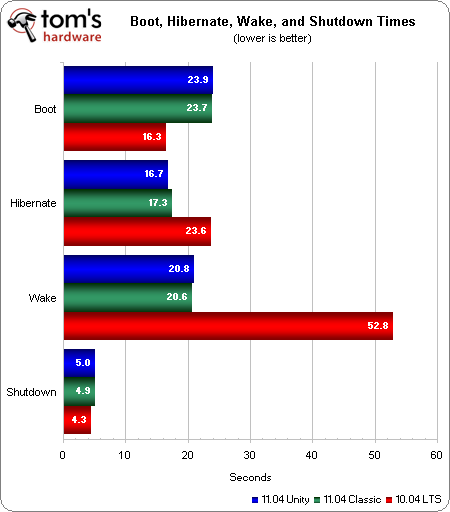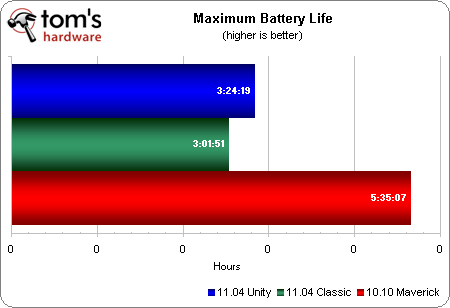Ubuntu 11.04 (Natty Narwhal), Reviewed In Depth
Ubuntu 11.04 (Natty Narwhal) has arrived, and we have the scoop on everything you need to know about Canonical's latest Linux, along with the usual review and benchmarks. Is this the change we've been waiting for, or is the Natty Narwhal a fail whale?
Benchmark Results: Essential Times
Boot, Hibernate, Wake, and Shutdown
As in our last Ubuntu review, Lucid would not hibernate properly unless we disabled the USB 3.0 and SATA 6 Gb/s ports on our test system's motherboard. Natty, on the other hand, has no problems with either peripheral interface, already representing a marked improvement over the older releases.
The boot times of Ubuntu 11.04 are about equal when using Unity and Classic, while Ubuntu 10.04 LTS boots up about seven seconds faster than the new release. Hibernate times reverse that finding, with the newer release going into hibernation about seven seconds before the LTS. Wake time is even worse for Lucid Lynx, taking more than 30 seconds longer to come out of hibernation than Natty Narwhal. Lucid again takes the lead in shut down time, although by less than one second. All three builds shut down in five seconds or less.
This is a mixed bag. While boot time is probably more important to most people than the other measurements taken, mobile users should enjoy the significant superiority of Natty's hibernation/wake capabilities.
Maximum Battery Life
This test is a new addition to the Linux benchmarking suite. Battery life is tested on the Dell Inspiron Mini 10v instead of the Core i5 system used in every other benchmark. The times were recorded using the Uptimed command line utility, intended to keep track of server uptimes. We set the screen brightness to full, turned off all screen saver and power management sleep functions, and set the Mini to Shut Down when the battery became critically low.
We used Opera 11.11 (2109) as the running application for this test. Opera was chosen over Firefox because the versions of Firefox available in the default repositories differ from release to release. Opera was chosen over Chrome due to the risk of mid-testing updates on that Web browser. An unfathomably large YouTube playlist provided the content, and WiFi was also active (as opposed to a hard-wired LAN connection) in order to more closely mirror real-world usage scenarios.
Get Tom's Hardware's best news and in-depth reviews, straight to your inbox.
Unfortunately, the emergency shut down procedures would not take effect in Ubuntu 10.04 LTS, which made obtaining a record impossible on that configuration. Uptimed loses its entire database in the event of a hard reset/power failure due to a bug. Therefore, we substituted Ubuntu 10.10 Maverick Meerkat for Ubuntu 10.04 LTS Lucid Lynx in this test.
Several weeks ago, Michael Larabel of Phoronix reported that Ubuntu 11.04 suffers serious battery life regressions from previous versions of the distribution. His findings were originally specific to the kernel, and he received a lot of feedback on Slashdot and other forums asking whether or not this would manifest in real-world usage.
We not only confirm his findings, but also demonstrate that this issue has very significant implications in actual use. It also appears that the Unity interface is not the root cause. In fact, Ubuntu 11.04 with Unity gets more than 20 minutes additional battery life than Ubuntu 11.04 Classic. The previous release, Ubuntu 10.10 Maverick Meerkat gets over two hours more battery life than Natty Narwhal, regardless of the user interface. This was probably the main deciding factor for Asus when it recently chose to ship Ubuntu 10.10 Maverick Meerkat as opposed to 11.04 Natty Narwhal on the new Eee netbooks
Mobile users are urged to seriously consider these results, and possibly even avoid the Natty Narwhal. On the other hand, Lucid has serious issues with hibernation, as does Maverick, making this a difficult choice for road warriors. I hate to say it, especially in an Ubuntu review, but the mobile edge goes to Windows for now.
Current page: Benchmark Results: Essential Times
Prev Page Test System Specs Next Page Benchmark Results: File Copy Times And Archiving-
jryan388 One problem I faced with the standard unity desktop is the horrible performance even on my Athlon II @ 3.6 and Radeon 5750. I upgraded on launch day, so maybe canonical fixed it by now, but the performance was absolutely abysmal. The easiest fix is the unity-2d package. Great performance, doesn't look any worse.Reply -
-Fran- 11.04 sucks; plain and simple.Reply
Power users can do little to nothing to fix things between gnome3 and the buggy Unity.
I wouldn't even bother with 11.04 when 10.04 is rock solid.
Cheers! -
davewolfgang I tried the upgrade, but unity is blech. I am still using the upgrade, but doing the classic.Reply
But I may go back to 10.10 for my EeePC. -
adamovera jryan388One problem I faced with the standard unity desktop is the horrible performance even on my Athlon II @ 3.6 and Radeon 5750. I upgraded on launch day, so maybe canonical fixed it by now, but the performance was absolutely abysmal. The easiest fix is the unity-2d package. Great performance, doesn't look any worse.Wow, that isn't right, the old X2 test system which has a considerably older Nvidia card runs it great. What's the full specs?Reply -
adamovera ksa-_-jedU should add more distros to the benchmarks like Debian, Fedora, and open SUSE.Fedora 15/GNOME 3 coming up next. I have never had any luck whatsoever with openSUSE, will keep trying new versions as they come out though.Reply -
bellman80 I tried 11.04. Unity was more annoying than useful. I installed the new Linux Mint instead, I'm a happy camper now.Reply -
Tamz_msc I'm going to stick with 10.04, because it has been running rock-solid without a glitch for almost a year. It was able to find drivers for my on-board audio which even Windows 7 could not find.Reply
Unity is not my cup of tea., though I'm looking forward to GNOME 3.0.
Till then Lucid Lynx FTW! -
RogueKitsune Unity is a nice idea, but not my cup of tea. Overall I am happy with the changes in 11.04. Right now i have my laptop(AMD Turion x2, radeon x1200)running it with no problems(everything worked out of the box)Reply

